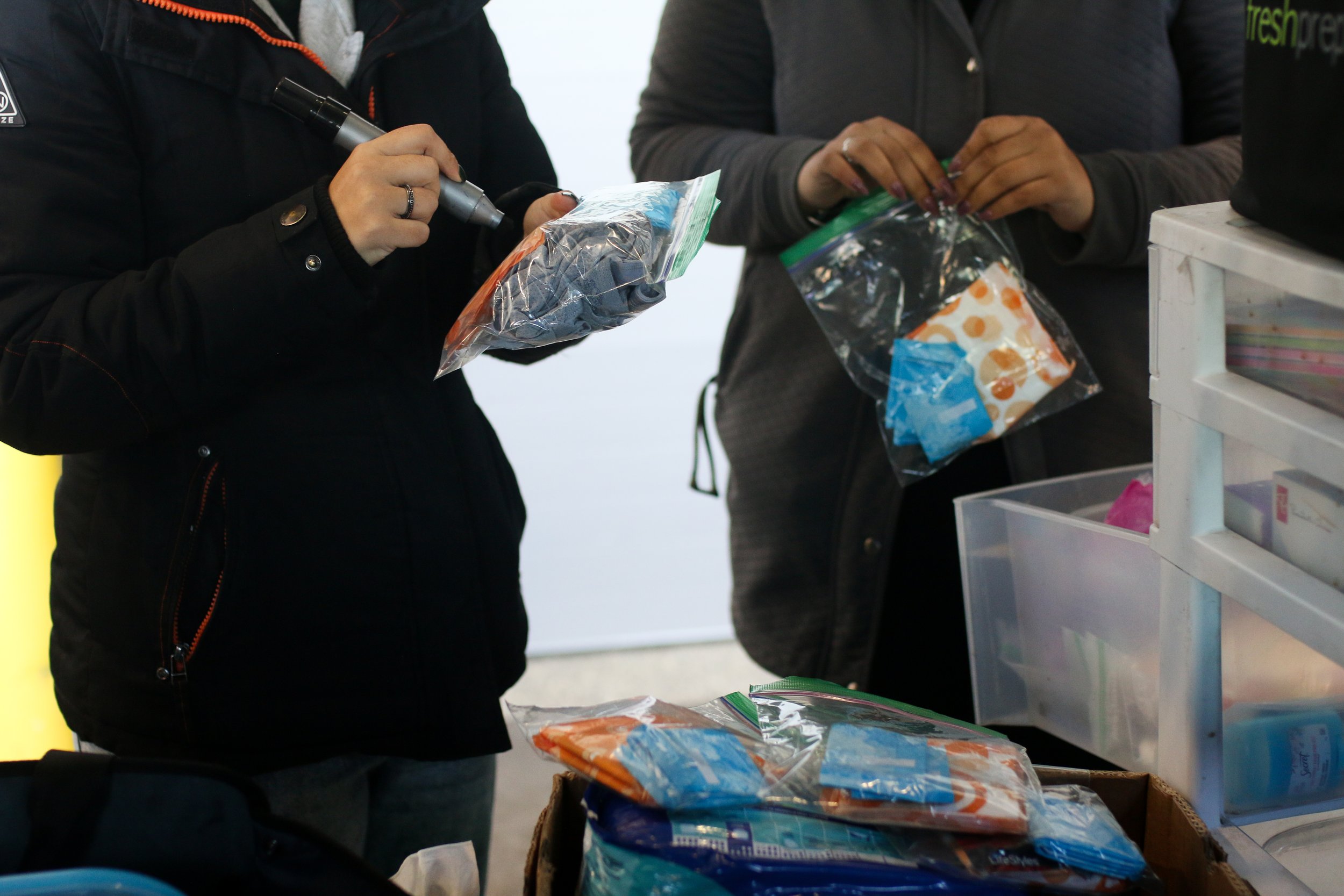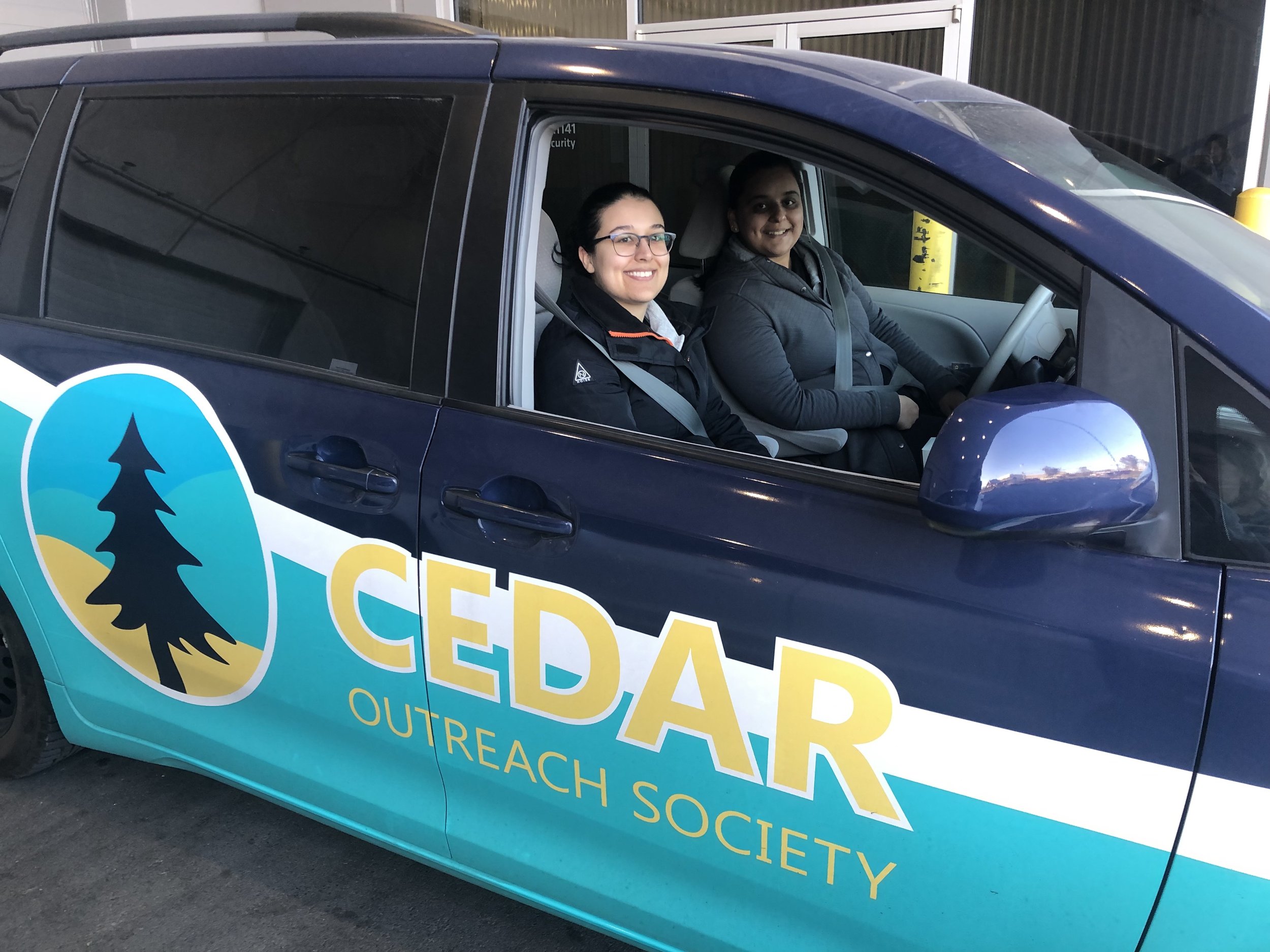Advocating for clients in a community that says “not-in-my-backyard.”
From a young age Morgan saw some of her family members battle with addiction, homelessness, and mental health struggles first hand, through this experience she developed compassion for people struggling with multiple barriers and applies this empathy into her outreach work today.
Besides being an Outreach Worker for CEDAR, Morgan works for Hearthstone Place, a low-barrier, supportive housing initiative in Abbotsford. It is a housing-first initiative, started in 2017. She also worked for The Cabin, a drop-in center for street-entrenched people before its closure earlier this year.
Morgan works alongside fellow Outreach Worker Maya on weekends. A typical shift starts by going to CEDAR’s storage unit to sort through donations and fill up the van with anything it might be missing. From there, Morgan and Maya start driving around Abbotsford, going to different known encampments to distribute those donations and harm reduction supplies to those in need.
Morgan and Maya packing up feminine hygiene kits
Morgan always wanted to go into policing since she was a child, so she went on to study Criminal Justice at the University of the Fraser Valley. During her studies she realized the workload placed on law enforcement was too heavy to actually solve the root causes of social issues like addiction and homelessness. Police are so bogged down with responding to as many calls as possible in a shift, alongside copious amounts of paperwork, that they don’t have the time to really sit down with someone and provide a holistic service.
“When I was choosing my practicum for my diploma, I said I would go anywhere,” said Morgan. “I had a lot of personal ties with street-entrenched people and people struggling with multiple barriers, so I thought it was a little too close to home if I did one that worked with street-entrenched people.”
Despite her hesitancy, Morgan ended up choosing a practicum through Archway, with the Cabin, a drop-in center for the street community. She raved about the practical and effective services this low-barrier drop-in center provided street-entrenched people. The center provided a sense of belonging and community for those on the fringes of society; it provided jobs for those living in active addiction; it provided basic human rights like bathrooms, showers, and hot meals. But sadly, partly due to nimbyism, the center was shut down despite providing useful services for 100 individuals a week.
“I got first-hand experience with people who were living with active addiction and homelessness but were coming to work, trying to better their community and educating service providers,” said Morgan of her practicum at The Cabin. “Half my training came from the service-provider point-of-view and half came from the street community point-of-view.”
When the center closed, Morgan started looking for another job, this time in outreach.
“It's hard to just go into a service and ask for things,” said Morgan.”[Outreach] is more like giving power to people; doing outreach we meet people literally at their doorstep wherever that is.”
That is where CEDAR Outreach comes in. When her old co-workers from The Cabin encouraged her to apply to be an Outreach Worker, she applied and got the job.
“Anyone can work this job, anyone can go and give out stuff, but it’s also having empathy and having your heart in the right place to meet people where they’re at without having an agenda.
Morgan expressed how her work has sometimes been hard because of NIMBYism (not-in-my-backyard mentality) and insensitivity of people who do not understand the struggles street-entrenched people face everyday.
Morgan picking up sandwiches donated by long-time Archway volunteer Louise Burns.
“I’m bi-racial, so when it comes to seeing how people treat you based on the color of your skin, I’ve always seen it but never understood how that happens,” said Morgan. “The same thing with someone with an addiction … I don’t see them any different because they have an addiction, they’re still people and I still love them. It’s not us versus them.”
One of Morgan’s strengths is advocating for those who are often discriminated against and face harsh judgment from other community members who don’t know the struggle of living outside. She recalls one incident when a citizen came up to her and a client she knew from The Cabin, and the citizen started berating her, telling her “you shouldn’t feed them.”
“The citizen started accusing the street community of breaking into cars and I told him, ‘I know this man, and it’s not him, he’s not the one doing that … The client I was with was apologizing to me [afterwards], and I was like ‘this has nothing to do with you.’”
Another part of the job Morgan enjoys is case management. She recalls one shift when she took a referral from the Abbotsford Police Department (APD) and spent a couple of hours talking to a nearly-70-year-old woman that had recently become homeless. Morgan said the woman was shocked at the fast response time of CEDAR, and was appreciative of the time Morgan spent just hearing what her needs were.
“I hope to connect with her more long-term because she has goals and wants to get certain services accessed, things she didn’t know could be offered,” said Morgan.
While case management takes more time, and staff ultimately connect with fewer people, there is something to be said about quality over quantity when it comes to connecting with clients. CEDAR staff like Morgan see these long conversations over coffee as building rapport and developing relationships; it’s these types of conversations that have the potential to really affect change in someone’s life.





